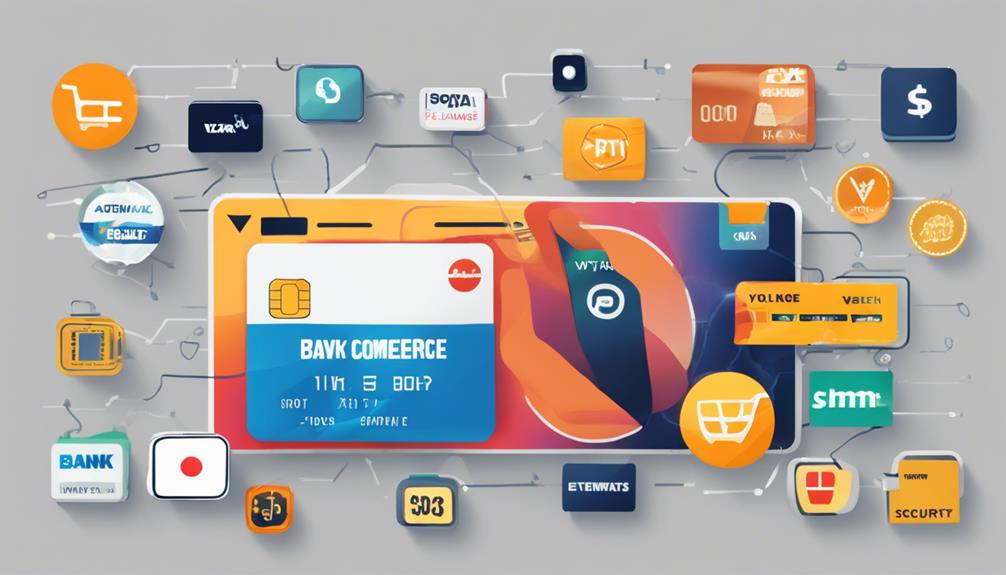Unpack the complexities of credit card processing fees to grasp the costs involved in accepting card payments. Fees typically range from 1.4% to 4.35% per transaction. Banks and card networks like Visa set interchange fees, impacting businesses directly. Assessment fees, fixed by networks, apply to each transaction. Understanding these components is crucial for effective cost management. Dive deeper into the intricacies to master payment processing strategies and optimize financial efficiency. Further insights await on managing high-risk industry costs and strategic partnerships for enhanced financial operations. Gain a thorough understanding for informed decision-making on managing credit card processing fees effectively.
Key Takeaways
- Credit card processing fees range from 1.4% to 4.35% per transaction.
- Interchange fees are crucial and set by banks and card networks.
- Understanding assessment fees aids in managing processing costs effectively.
- Network fees are set by card networks like Visa and Mastercard.
- Negotiating lower rates involves understanding fee breakdown and industry-specific factors.
Understanding Credit Card Processing Fees

To grasp the intricacies of credit card processing fees, break down the components that contribute to your overall costs. Credit card processing involves various fees that merchants incur when accepting card payments. These fees typically range from 1.4% to 4.35% of each transaction's total amount.
Square, for instance, charges 3.5% plus $0.15 for virtual terminal transactions, illustrating an important fee structure. A significant portion of these costs comes from interchange fees, which are established by banks and card networks. Understanding the breakdown of interchange, assessment, and additional fees is vital for negotiating better rates with payment processors.
SoFi Bank's 2022 report on average merchant fees provides valuable insights into the current landscape of credit card processing fees. By familiarizing yourself with these components, you can make informed decisions to optimize your payment processing expenses and enhance your bottom line.
Breakdown of Interchange Fees

Interchange fees, set by banks and card networks, form an essential aspect of understanding credit card processing costs. These non-negotiable fees play a pivotal role in the transaction process. Banks that issue credit cards receive the majority of these fees, which can vary depending on factors such as the type of card used and the industry in which the transaction takes place.
Merchants bear the cost of rewards and bonuses through these interchange fees. This means that when customers earn points or cashback, part of that cost is covered by the interchange fees paid by the merchant. Understanding these fees is crucial for businesses as interchange fees constitute a significant portion of credit card processing costs. By grasping how these fees work, merchants can better navigate the complex world of credit card transactions and make informed decisions to optimize their payment processing strategies.
Unpacking Assessment Fees

When looking at the POINTS of unpacking assessment fees, you'll focus on understanding:
- interchange fees
- the impact of network fees
- managing other assessment charges
These aspects play a significant role in determining the overall cost of credit card processing for your business. By grasping these points, you can make informed decisions to optimize your payment processing expenses.
Understanding Interchange Fees
Understanding assessment fees, essential for businesses to accurately calculate their total processing expenses, requires delving into the domain of interchange fees. Here are some key points to keep in mind:
- Interchange fees are set by card networks like Visa and Mastercard.
- These fees are paid by the merchant's bank to the customer's bank.
- They're influenced by various factors such as transaction type and card brand.
- Interchange fees are non-negotiable and represent a significant portion of processing costs.
- Having a clear understanding of interchange fees is vital for managing overall credit card processing expenses effectively.
Impact of Network Fees
Assessment fees play a pivotal role in determining the overall expenses businesses incur for processing credit card transactions. Ranging from 0.08% to 0.09% of the transaction value, these non-negotiable fees set by card networks like Visa and Mastercard are essential for covering network operational costs.
Merchants are charged assessment fees on every transaction processed through their merchant account, impacting the total cost of using Merchant Services. Understanding these fees is necessary for accurately calculating credit card processing costs. By grasping the significance of assessment fees, businesses can better manage their expenses and make informed decisions regarding their payment processing strategies.
It's important to stay informed about these fees to optimize financial planning and operational efficiency.
Managing Other Assessment Charges
To effectively manage other assessment charges in credit card processing, businesses must also consider additional fees beyond the standard assessment fees set by card networks like Visa and Mastercard. When dealing with assessment fees, keep in mind the following key points:
- Assessment fees typically range from 0.08% to 0.09% of the transaction amount.
- These fees are charged by card networks for card usage.
- Assessment fees are non-negotiable and contribute to the overall cost of credit card processing.
- They're separate from interchange fees and cover network operational costs.
- Understanding and managing assessment fees is vital for effective cost control in credit card processing.
Exploring Processing Fees

When exploring processing fees, it's important to understand the fee structure overview, the factors that impact costs, and how to negotiate lower rates.
By grasping the breakdown of processing fees, you can better navigate the complexities of credit card transactions.
Discovering ways to lower these fees can have a notable impact on your bottom line in the long run.
Fee Structure Overview
Understanding how credit card processing fees are structured is essential for merchants looking to optimize their payment processing costs. Here is an overview to help you grasp the fee structure:
- Credit card processing fees can range from 1.4% to 4.35% for merchants in 2022.
- Square charges 3.5% + $0.15 for virtual terminal transactions.
- Interchange fees, set by banks and card networks, are non-negotiable and vary based on card type and industry.
- Wholesale rates for interchange fees are the same for all processors.
- Understanding the breakdown of fees is essential for negotiating better rates with credit card processors.
Factors Impacting Costs
Factors influencing processing costs, such as transaction type and card classification, directly impact the fees merchants incur during credit card processing. For instance, whether a transaction is card present or card-not-present plays a crucial role in determining the processing fees. Additionally, the type of card used, like Mastercard Core or World Elite, significantly influences the costs involved. Visa and Mastercard have varying interchange rates, ranging from 0.8% to 2.45%, affecting the final expenses for businesses. Wholesale rates are consistent across processors but markups by processors can impact overall fees. Interchange rates, which are industry-specific and vary based on Merchant Category Code (MCC), also play a role in determining processing costs for different businesses.
| Factors Influencing Costs | Impact |
|---|---|
| Transaction Type | Directly influences fees |
| Card Type | Significantly affects costs |
| Visa/Mastercard Rates | Vary between 0.8% to 2.45% |
| Wholesale Rates | Consistent across processors |
| Interchange Rates | Industry-specific, MCC dependent |
Negotiating Lower Rates
To navigate the landscape of credit card processing fees effectively, consider engaging in negotiations to secure more favorable rates that align with your business needs and industry dynamics. When negotiating lower rates for payment processing, keep these key points in mind:
- Understand your fee breakdown and industry-specific factors.
- Interchange fees, assessment fees, and incidental fees can be negotiated.
- Processors like Square offer room for negotiation on specific percentage rates.
- Factors such as transaction type, card type, and industry influence interchange rates.
- Leveraging industry knowledge and payment processing expertise can help secure lower rates through negotiation strategies.
Managing High-Risk Industry Costs

High-risk businesses in certain industries often encounter higher credit card processing fees ranging from 3% to 10%. These industries, such as adult entertainment, travel, and nutraceuticals, are often classified as high-risk, leading to increased processing costs. High-risk payment processing solutions provide specialized services to mitigate fraud risks, resulting in higher fees. Due to the nature of their operations, businesses categorized as high-risk typically face more chargebacks, contributing to elevated processing expenses. Understanding the specific factors that classify a business as high-risk is essential for managing and optimizing payment processing costs.
| Industry | Average Processing Fee | Common Risk Factors |
|---|---|---|
| Adult Entertainment | 7% | Age-restricted content |
| Travel | 5% | High cancellation rates |
| Nutraceuticals | 8% | Regulatory challenges |
Partnering for Financial Efficiency

Partner with Touch Suite to enhance your financial efficiency through strategic partnerships with industry leaders like Visa, Mastercard, Discover, AMX, and Wells Fargo. Touch Suite's collaboration with these major players in the financial industry guarantees that you have access to cutting-edge solutions for optimizing your financial processes. By leveraging Touch Suite's extensive experience and strong partnerships, you can trust in their ability to provide reliable and efficient services for your business.
- Access Cutting-Edge POS Systems: Benefit from Touch Suite's partnerships to access state-of-the-art POS systems that streamline your transactions.
- 24/7 Domestic US Support: Enjoy round-the-clock support from Touch Suite, ensuring that any issues with your financial systems are promptly addressed.
- Long-Term Partnerships: Build lasting relationships with Touch Suite, known for establishing enduring partnerships that prioritize your financial efficiency.
- Credibility and Trust: Rely on Touch Suite's credibility and trustworthiness in the industry to enhance your financial operations.
- Financial Efficiency Optimization: Collaborate with Touch Suite to optimize your financial efficiency and maximize your business's potential.
Frequently Asked Questions
What Are the Hidden Costs of Credit Card Processing?
Hidden costs of credit card processing include fees for chargebacks, PCI compliance, and terminal rentals. Assessment fees, typically 0.08% to 0.09% of transactions, are often overlooked but can accumulate.
Payment gateway fees link online stores to merchant accounts and come with extra expenses. Terminal fees cover POS terminal rentals impacting business processing costs.
Unexpected charges like chargeback fees can catch merchants off guard and impact their profits if not managed properly.
How Do You Explain Credit Card Processing Fees?
When it comes to understanding credit card processing fees, think of them as the necessary evil in the world of electronic payments. These fees typically consist of interchange, assessment, and processing fees. Interchange fees are fixed by card networks and banks.
Can I Charge My Customers a Credit Card Processing Fee?
Yes, you can charge your customers a credit card processing fee in most states. However, eleven states prohibit surcharging credit card transactions. It's essential to disclose any surcharges to customers before the transaction.
These surcharges are typically capped at the cost of processing, which is around 4%. In some states, offering a cash discount instead of a surcharge is a legal alternative. Make sure to comply with the regulations in your state to avoid any issues.
Why Are Credit Card Processing Fees so High?
Credit card processing fees are high due to the complex fee structure that includes interchange fees, assessment fees, and processing fees. Interchange fees, set by card networks and banks, make up a significant portion of the total fees paid by merchants.
Factors like card type, transaction type, and industry influence the variability in credit card processing fees. The non-negotiable nature of interchange fees contributes to the perceived high costs of credit card processing for businesses.
Understanding the breakdown of credit card processing fees is essential for businesses to effectively manage costs and optimize their payment strategies. Many businesses may not be aware of the hidden charges in credit card processing, which can significantly impact their bottom line. By taking the time to thoroughly understand the breakdown of these fees, businesses can identify areas where they may be overpaying and take steps to negotiate better rates with their payment processors. This knowledge can ultimately lead to cost savings and a more efficient payment processing system for businesses.
Conclusion
As you navigate the complex world of credit card processing fees, remember that knowledge is power. By understanding the breakdown of interchange fees, assessment fees, and processing fees, you can make informed decisions to manage costs effectively.
Partnering with the right financial services provider can also help streamline your payment processes and improve financial efficiency.
Stay informed, stay proactive, and watch your business thrive in the ever-evolving landscape of payment processing.










